Pear variety Bergamot Moscow
Moscow bergamot is a pear variety with fruits of the autumn ripening period, bred at the Moscow Agricultural Academy. K.A. Timiryazeva (abbr. TSKHA, now RGAU-Moscow Agricultural Academy). The exact genetic origin has not been determined. This is probably a 3rd generation seedling obtained through repeated crosses of the Ussuri pear with Western European varieties. The authorship is assigned to S.T. Chizhov, S.P. Potapov, V.I. Susov, A.V. Isachkin, A.G. Matushkin, N.V. Agafonov and I.I. Khanjyan. In 1997, the variety was submitted for State testing. Recommended for growing in the Central Region.
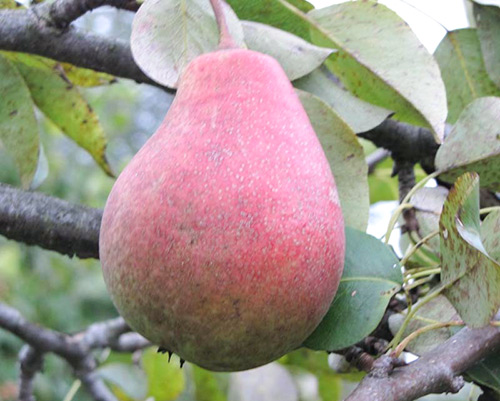
The trees are medium vigorous and have a compact, medium leafy oval crown. Kidney awakening and the ability to form shoots in this pear are at a high level. Mixed fruiting is characteristic, but fruit setting occurs most often on spears and ringlets of various ages.
Shoots are brownish-light brown in color, buds are appressed, internodes are shortened. Lentils are large in size, oblong in shape, present in an average amount. Leaves are of medium size, elongated-oval in shape, with serrate-crenate serration along the edge. Petioles are short in length, above average or thick in thickness. Stipules are characterized by above average length.
The size of the fruits is above average (the weight of one pear is on average 150 - 160 grams); in the shape of a pear, bergamot-like (rounded or flattened-rounded), apple-shaped, ribbing is weak. The skin is of medium thickness and light yellowish-green in color; The integumentary color is absent or appears on a small part of the fruit from the sunny side in the form of a faint brownish-red blush. Subcutaneous dots are large in size, present in an average number. The stalks are thick, short or very short in length. The funnel is small, narrow in shape. The saucer is small in size, narrow in shape, sometimes it can be ribbed. Half-open cup.
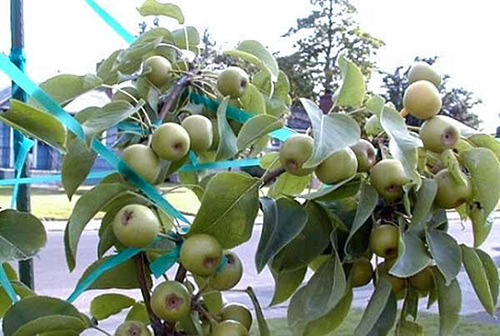
The pulp is medium-dense, juicy, has a good sweet-sour taste. On a 5-point tasting scale, the attractiveness of the appearance of the fruit is estimated at 4.1 points, the assessment of taste is 3.9 points. In terms of chemical composition, the fruits of Moscow Bergamot contain: dry matter (13.5%), the amount of sugars (8.1%), the amount of acids (0.84%). The purpose of the fruit is universal.
The period of removable maturity falls in the first decade of September: at this time, the main color of the fruit changes from dark green to lighter. Under normal conditions, the consumer period is short, lasts about 10 - 12 days (until the 3rd decade of September); when stored in the refrigerator, the fruits remain fresh for 1.5 - 2 months.
The early fruiting rate of the Moscow Bergamot pear is low; after grafting, the trees enter the fruiting season in the 4th - 5th year. The yield is average. According to the data obtained from the experimental fruit garden of the TSKHA, the average yield is 19 kg of fruits per tree. Productivity from 1 sq.m. crown projection is 4.12 kg.
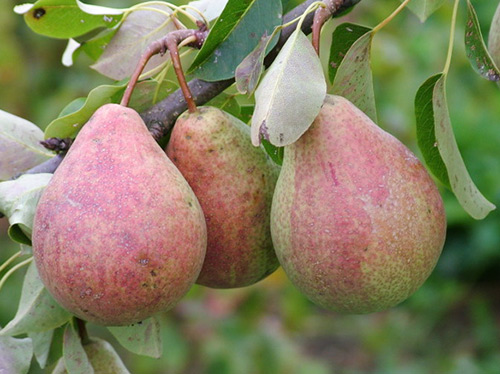
This pear is self-fertile. Nevertheless, to increase the yield, it is recommended to plant pollinating trees nearby (for example, varieties: Space, Marble, Elegant Efimova).
Moscow bergamot is ranked among the highly winter-resistant varieties; after the harsh winter of 1986 - 1987. only minor damage was recorded. Also, this pear is highly resistant to scab and brown spot; fruit rot resistance is good.
The main advantages of the variety include: very large-fruited fruits, high winter hardiness, long flowering period, compact crown size, good productivity, high resistance to major diseases.
Among the significant disadvantages can be distinguished: a relatively short period of fruit consumption, as well as a deterioration in taste in dry years (excessive astringency and acidity accumulate in pears).
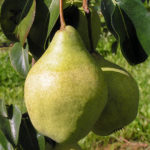
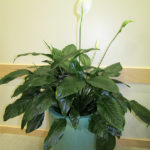
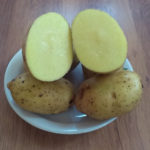
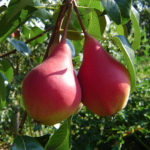
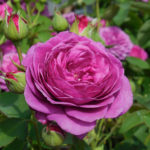
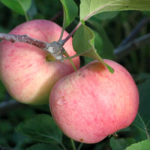



A wonderful variety. In our garden, one tree, planted in the 60s, still bears fruit, however, after a year. The tree is not spreading, the fruits are always sweet. Nearby there is a Dula pear, believed to pollinate Bergamot. The scab for the entire time was only once or twice. There are many pears, but they do not last long. Good for jam, compotes and just a meal. The pulp is juicy and soft. Pears have been crushed in recent years.